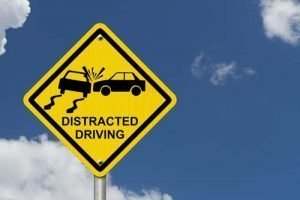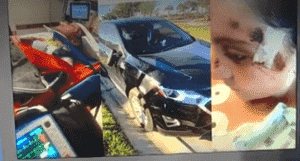
If you are texting while driving, Florida’s Wireless Communications While Driving Law authorizes law enforcement officers to stop you and issue you a citation. The law, covered in Florida Statute § 316.305, took effect July 1, 2019.
Overview and Objectives of the New Distracted Driving Law
When Governor Ron DeSantis signed the bill in May 2019, he cited statistics from 2016 showing that almost 50,000 accidents, including more than 3,500 serious injuries, and 233 fatalities were caused by distracted driving.
DeSantis told U.S. News & World Report that he hoped Florida’s new texting while driving law would heighten road safety, as well as prevent collisions, injuries, and deaths in Florida.
Also referred to as the “Florida Ban on Texting While Driving Law,” the aim of this new legislation is to lower the number of injuries and deaths, as well as reduce healthcare costs, property damage, and auto insurance rates that accompany collisions caused by distracted driving.
What the New Texting While Driving Law Says
Specifically, the law makes it a primary traffic offense in Florida to text and drive. Law enforcement personnel have the right to stop drivers and issue citations for texting while driving. Before the new ban, texting while driving was only a secondary traffic offense, so police officers could not pull a driver over solely for texting while driving.
What the Law Encompasses
Under Florida Statutes section 316.305: “A person may not operate a motor vehicle while manually typing or entering multiple letters, numbers, symbols, or other characters into a wireless communications device or while sending or reading data on such a device for the purpose of nonvoice interpersonal communication, including, but not limited to, communication methods known as texting, emailing, and instant messaging.”
The law defines a “wireless communications device” as any handheld device—or a device being used as a handheld—that is engineered for the purpose of:
- Receiving or sending messages
- Storing and/or accessing data
- Connecting to the internet
The ban’s definition of wireless communications devices further extends to include any communications device as described in Florida Statute § 812.5 that enables text communications.
What the Texting While Driving Ban Excludes
If you are parked in your motor vehicle, perhaps at a stop sign, you are not banned from texting in the vehicle.
Other drivers who are exempted from Florida’s Ban on Texting While Driving Law include the following:
- People operating an authorized emergency vehicle, like a police officer, firefighter, or emergency medical services professional.
- Someone who is calling law enforcement to report an emergency or criminal activity.
- Individuals who are receiving texts related to safety such as weather alerts, radio broadcasts, or navigation instructions.
- Drivers who are communicating in a way that does not require that they enter multiple characters.
- People who are using their devices in ways that do not require reading text messages.
- Individuals who are operating an autonomous motor vehicle.
If you need assistance in understanding your rights under this new law, contact our texting while driving lawyers. They will explain everything you need to know and help you file a claim or a lawsuit against a driver who hit your car because they were texting while driving. As you will learn below, you might be eligible for receiving compensatory damages depending on your case.
Your Rights If You Are Stopped for Texting While Driving
The new ban does provide for your rights if you are stopped for texting and driving. The police officer must inform you of your right to refuse a search of your wireless communications device. The officer is not authorized to access your device or confiscate it without a warrant, nor are they allowed to coerce you into permitting them to search the device.
If Texting While Driving Caused a Crash That Injured You
Florida’s new ban also specifies that if another individual was texting while driving and caused a crash that results in your injury, the at-fault party’s billing records for their wireless device are admissible as evidence.
If you have been injured in a motor vehicle collision caused by a person who was texting while driving, you deserve to receive compensation for your damages. The Law Offices of Anidjar & Levine will go the extra mile to provide you with responsive legal care. You worry about getting better. We will take care of the rest!
Call the Law Offices of Anidjar & Levine at 1-800-747-3733 for a free case review and legal consultation.










